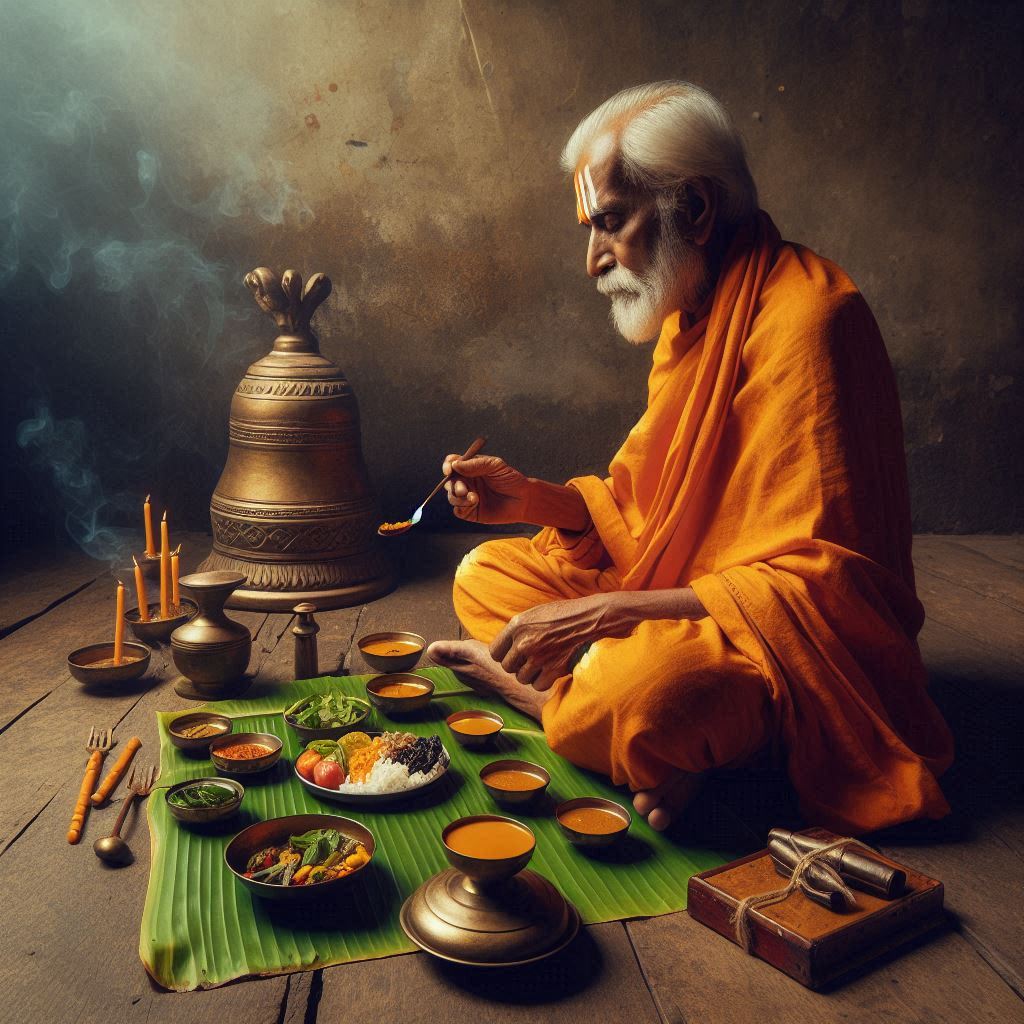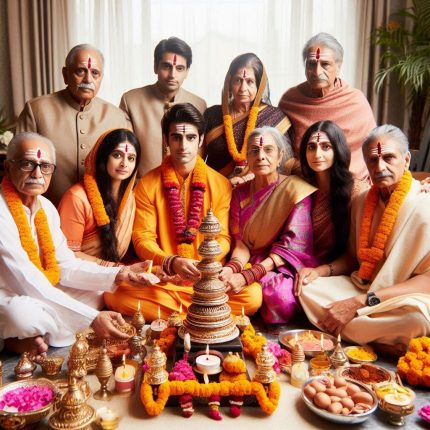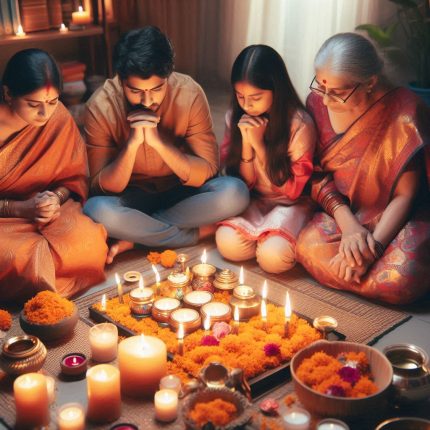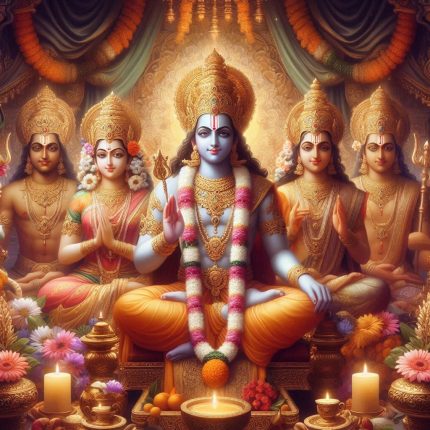Brahmin Bhojan: Honouring the Departed with Sacred Feasts
Samagri
for Puja:
Haldi [organic] (20gm), Kumkum [organic] (20gm), Tulsi Mala (1), Diya Batti (5), Beetle Nuts (5), Desi Ghee (20ml), Honey (20ml), Jaggery (Gudh) (20gm), Akshata [Yellow rice] (20gm), Yagno-paveetha (5), Karpoora [camphor] (5Tabs), Red/White/Yellow Cloth(1 mtr), Prasad [Laung, Elaichi, Mishri] (20gm), Mouli (25mtr), Ganga Jal (15ml), Durva [fresh] (1), Agarbatti (6)/Dhoop (2), Dakshina (100INR), God Idols (pair), Sambrani (2), Sambrani Holder (1), Kalash [small copper] (1), Panchpatra [small copper] (1), Diya Holder (2), Panchamrit spoon (1), Karpoora Holder(1), includes perishables [Beetle Leaves [fresh] (9), Flowers [fresh] (incl mala), Tulsi [fresh], Mango Leaves [fresh] (7)]
Small Havan:
Cow Dung Cake (2), Mango Wood (250gm), HavanSamagri [20+ Grganic Herbs] (100gm), Ghee (20ml)
Yajman to provide:
Curd (100gm), Milk (100ml), Mithai (250gm), Fruits [5types], Coconut (1), HavanKund, SuchiSarva (Havan Spoon) (1), Kalash [big] (1), Bowl [preferably copper/silver] (1), Spoon [preferably copper/silver] (1), Utensils [2 big Plates (for Aarti/Samagri), disposable Plates, Bowls & Spoons], First solid food (preferably Kheer or Payasam)
Introduction
The Brahmin Bhojan, also known as the Brahmin Meal or Brahmin Feast, is a significant ritual in Hindu death ceremonies. This ritual involves hosting a meal for Brahmins (priests) and family members as a mark of respect and to perform religious obligations following the death of a loved one. The Brahmin Bhojan is a deeply symbolic act of charity and gratitude, aimed at honouring the departed soul and seeking divine blessings for their peace and liberation.
Importance and Significance of Brahmin Bhojan
The Brahmin Bhojan is a ritual with profound cultural and spiritual significance:
- Respect and Gratitude: The offering of a meal to Brahmins is a traditional way of showing respect and gratitude. It is believed that such acts of charity help in purifying the soul and fulfilling religious duties.
- Spiritual Merit: Hosting a Brahmin Bhojan is considered a pious act that generates spiritual merit for the family. It is believed to aid the departed soul’s journey to the afterlife and ensure their peaceful transition.
- Cultural Tradition: The ritual upholds cultural values and traditions, reinforcing the importance of charity and respect for spiritual leaders.
- Community and Family Bonding: The Brahmin Bhojan brings family members and community together, providing a space for collective remembrance and support during a time of mourning.
Benefits of Brahmin Bhojan
Participating in the Brahmin Bhojan offers several benefits:
- Spiritual Fulfilment: The ritual is believed to provide spiritual satisfaction and merit for both the departed soul and the family members performing the rites.
- Blessings for the Departed: Offering food to Brahmins is thought to bring blessings and divine favour to the departed soul, aiding their journey to peace and liberation.
- Cultural Continuity: Engaging in traditional practices ensures the preservation of cultural and religious customs, maintaining a connection to ancestral practices.
- Emotional Comfort: The gathering of family and community provides emotional support and comfort, helping to navigate the grieving process.
Occasions to Perform Brahmin Bhojan
The Brahmin Bhojan is typically performed as part of the death rituals and can be scheduled at specific times based on cultural and familial traditions:
- Post-Death Rituals: The meal is usually hosted on the day of the final rites or during the mourning period, often coinciding with other related rituals such as the Shraddha or Tarpan.
- Death Anniversary: Some families may also host a Brahmin Bhojan on the death anniversary of the departed as a mark of continued respect and remembrance.
Brahmin Bhojan Vidhi (Procedure)
The Brahmin Bhojan involves several steps, each reflecting the ritual’s significance:
- Preparation: The family prepares for the Bhojan by organizing a meal and inviting Brahmins and close family members. The meal typically includes a variety of vegetarian dishes, reflecting traditional dietary practices.
- Invitation: Brahmins are invited to participate in the ritual. The invitation is made with respect and includes details about the timing and location of the meal.
- Puja and Offerings: Before the meal, a brief puja may be performed to seek divine blessings and purify the space. Offerings are made to deities and ancestors, and prayers are recited for the departed soul.
- Serving the Meal: The meal is served to the Brahmins, who are honoured guests. It is customary to serve a variety of traditional dishes, including rice, lentils, vegetables, and sweets.
- Charitable Acts: In addition to the meal, families may make donations or perform acts of charity in the name of the departed soul. This reflects the spirit of giving and helps in fulfilling religious duties.
- Blessings and Conclusion: After the meal, the Brahmins offer blessings to the family. The ceremony concludes with a gesture of thanks and respect, often involving the distribution of gifts or tokens of appreciation to the Brahmins.
Brahmin Bhojan Shubh Muhurat
The Shubh Muhurat (auspicious time) for the Brahmin Bhojan is typically determined based on traditional schedules and family practices. Consulting with a priest or astrologer can help identify the most suitable time for the ritual, ensuring that it aligns with cultural and religious guidelines.
Conclusion
The Brahmin Bhojan is a meaningful and sacred ritual that plays a vital role in Hindu death ceremonies. By hosting this revered meal, families honour the memory of their departed loved ones, fulfil religious obligations, and seek divine blessings for peace and spiritual merit. The ritual not only reinforces cultural traditions but also provides an opportunity for communal support and remembrance during a time of loss. Through the Brahmin Bhojan, families express their respect, gratitude, and commitment to spiritual values, ensuring a dignified and reverent farewell to the departed soul.






